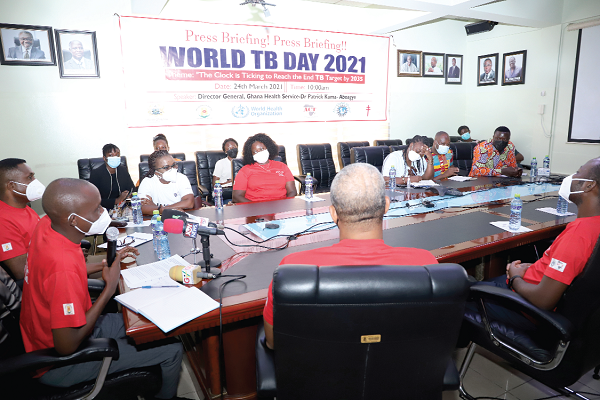
GHS to treat all Tuberculosis cases
The country yesterday joined the global community to commemorate this year's World Tuberculosis (TB) Day with a renewed commitment to treat all TB cases.
The Ghana Health Service (GHS), which organised the forum, said that had become necessary because although treatment was free, the detection of TB cases declined by 15 per cent in 2020. This meant that more people with the highly infectious disease remained undiagnosed, thus posing a public health threat and undermining strides made in the fight against the disease over the years.
The day is observed every March 24 to raise public awareness of the devastating health, social and economic consequences of TB and step up efforts to end the global TB epidemic.
Globally, it was marked on the theme: “The clock is ticking,” to convey the message that the world was running out of time to act on the commitments to end TB by 2035, made by global leaders.
Reduction in cases
According to the National TB Control Programme, a unit under the GHS, the 15 per cent reduction in case detection translated in a reduction from 14,691 cases in 2019 to 12,443 in 2020.
“We have the needed platform in the country to propel us to achieve the set targets. Our focus now is to re-strategise to improve TB case finding amid the COVID-19 pandemic. We have a robust and a well integrated health system with 132 GeneX machines and 55 digital X-rays in the country to test for TB.
Some of the equipment have been calibrated to also start testing for COVID 19,” the Director-General of the GHS, Dr Patrick Kuma-Aboagye, said in a speech read on his behalf at a media engagement in Accra yesterday as part of activities to mark the day.
He said respiratory infection remained one of the biggest infectious diseases that killed in low and middle-income countries, including Ghana, hence no case should be missed.
Dr Kuma-Aboagye said stigma was one of the hindrances in the fight against TB, and that the GHS needed all affected patients to report to health facilities for treatment, which he reiterated was free.
According to him, case detection, a shared responsibility, was critical to eradicating the disease.
He, therefore, appealed to all health workers to be on the lookout for potential cases at the outpatients departments and encouraged all persons coughing, having difficulty in breathing and fever to present themselves for testing and treatment.
He added that the country remained resolute in eradicating TB by 2035, and called for the support of all.
He stated that as part of plans to help eradicate the disease, all TB patients were enrolled onto the NHIS for free and received living support to reduce its catastrophic cost.
“I entreat all health workers to be on guard and set up a one-stop screening point to actively screen patients at OPDs and all entry points in our health facilities for TB and COVID-19.
“We will also entreat the general public to report to the nearest health facility whenever they experience any of the symptoms,” the D-G said.
COVID-19
The National TB Control Programme Manager, Dr Yaw Adusi-Poku, attributed the 15 per cent decline in case detection to the COVID-19 pandemic that caused reduction in OPD attendances for fear of possible infection.
“We should also remember that the symptoms of COVID-19, which include cough, fever, chest pains and difficulty in breathing, are similar to TB,” he said.
Preliminary results of a pilot study in the Greater Accra Region on testing for both COVID-19 and TB at the same time showed that out of the 206 samples tested from January to March 2021, nine per cent (19 cases) tested positive for TB, while two per cent (four cases) tested positive for COVID-19. TB infection is spread through droplets from an infected person.
